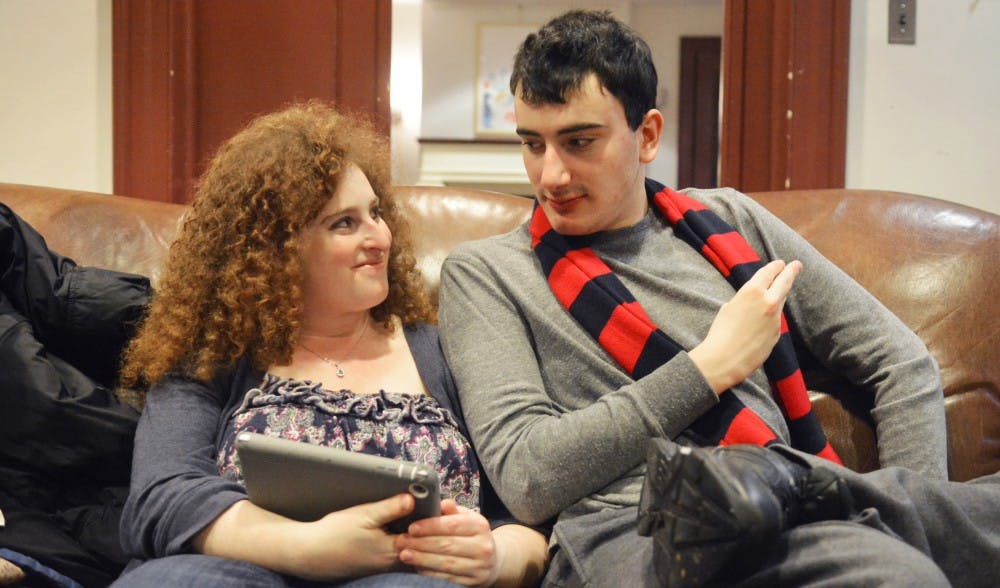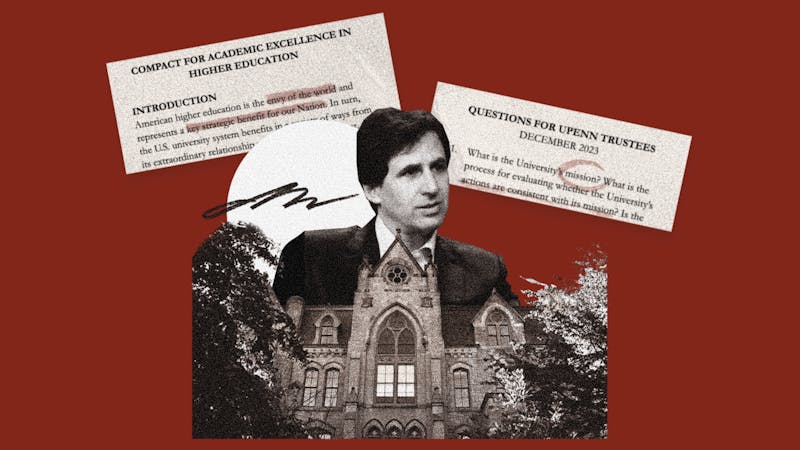
Like many students, Daniel Bergmann sometimes worries that he is doing college wrong. Not necessarily because he regrets falling behind on work or not joining enough clubs. It’s because for Daniel, college isn’t just an education — it’s a cure.
“Am I misusing college for my personal health?” Daniel, 19, typed out on an iPad during a November interview. He guided his interpreter’s hand over the letters on an app he and his parents developed called iMean. He needs a steady hand to help him concentrate his thoughts into words and keep his autism from getting in the way of communicating. Daniel, who takes two classes at Penn through the College of Liberal and Professional Studies’ Young Scholars program, has come to think of education as a form of healing.
“Popcorn!” Daniel would shout out in the middle of the interview, rapidly rubbing his thumbs against his fingers and shaking his head loosely. “Pop-corn,” he repeated slowly, the syllables snapping off his tongue like bursting kernels. At the same time, Daniel would be typing an eloquent reply about the nature of language and communication on his iPad with the help of his interpreter — either his father Michael or 2014 College graduate Kate Herzlin.
Daniel’s form of communication is similar to a controversial method known as facilitated communication, which became prominent among people with autism in the 1990s. In facilitated communication, people who cannot verbally communicate guide interpreters’ hands over letters to form words and phrases. Daniel’s parents said that the person he learned from claimed the method is not facilitated communication — a method that was called into question by a series of studies showing that even well-meaning interpreters subconsciously interjected their thoughts into the communications.
However, Daniel and those close to him are not concerned about ensuring his communication is completely independent.
“If you can tolerate the uncertainty, if you can tolerate the idea that there is some sharing in the communication, not only can you figure out what Daniel is saying, but you realize that all communication is shared,” Michael, Daniel’s father, said.
“Nobody could get Dan to spell that autism is a privilege,” he added.
In some ways, Daniel’s explicitly shared form of communication makes him especially suitable for English 88 at the Kelly Writers House — one of the two classes Daniel is currently enrolled in. Before Penn, Daniel had only attended special education schools. Now, he has applied for admission in an LPS degree program.
A New Yorker, Daniel found Penn in 2012 through the massive open online course “ModPo,” taught by English 88 professor and Writers House Faculty Director Al Filreis.
“This course [English 88] is about writing that is open rather than closed, and that meani ng-making in modern art is collaborative. It’s a collaboration between writer and reader,” Filreis said. “The writer does his or her art and the reader must do the same.”
Herzlin, Daniel’s in-class interpreter, said his form of communication is really “just a microcosm and a more obvious way of how we all communicate.”
“We think we have these 100 percent individual minds, but the way that I explain the way I love something to you is different from the way I explain something I love to my mother,” Herzlin added.
For Daniel, his interpreter acts not only as a medium of communication, but as a support. It’s “not the technique as much as the loving help of someone standing with me against the disease,” Daniel said.
As far as loving support goes, Daniel has plenty. His parents drive him from New York to Philadelphia every Tuesday for the class, and stay in a hotel through Thursday, after the second class of the week. Filreis said his class learned quickly to adapt to Daniel’s communication style, and now listen closely to what he says in class.
“He has a very strong understanding of how important it is to build community through literature, and I think I’ve learned that there’s so much that I can learn from what I read when I talk about it with other people,” College senior and classmate Dawn Androphy said.
Through working so intimately with Daniel, Herzlin has learned to listen more closely to her peers and be fully present in every conversation. She’s also realized the deep power of education in “how much it can transform someone’s life.”
Filreis said that Daniel is not the only ModPo student who has an inspiring story. Across the globe, he’s had students in the MOOC who suffer from fibromyalgia, cancer or are surviving a hurricane disaster.
“There’s a lot of people out there who want to learn and they’re not all between the ages of 18 and 22 and somehow able to pay $60,000 for it,” Filreis said.
While his autism may keep him from conversing aloud in a conventional way, or from playing an instrument — “Damn it, no,” he typed when asked — Daniel recognizes that his condition grants him a unique perspective on the world. A perspective that highlights the collaborative form of communication we all use every day.
“I love to learn,” Daniel said. “But I love to learn together more.”
The Daily Pennsylvanian is an independent, student-run newspaper. Please consider making a donation to support the coverage that shapes the University. Your generosity ensures a future of strong journalism at Penn.
DonatePlease note All comments are eligible for publication in The Daily Pennsylvanian.







